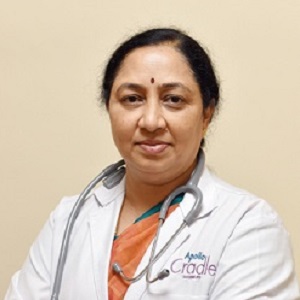Female fertility issues can happen for several reasons that can be treated and managed by medical assistance.
Fertility is an important aspect of any woman's reproductive health. Female fertility refers to a woman's ability to conceive and carry a baby to term. Some fertility issues are a major concern for many women but can be treated with the right guidance and care. This article will explore what female fertility is and how it affects a woman's reproductive health. Additionally, we will discuss the different factors that can impact a woman's fertility and the ways to help improve female fertility.
The common symptoms of female fertility problems
In most cases, women who face issues with fertility may experience irregular or skipped menstrual cycles. Other than that, many women face symptoms like
- Irregular periods
- Painful or heavy periods
- No periods
- Symptoms of hormone fluctuations
What causes female fertility problems?
Various health issues can lead to fertility difficulties for women, such as:
- Disruptions to the ovulation process can cause difficulties in releasing eggs from the ovaries. These disturbances can be caused by certain hormonal imbalances, like polycystic ovary syndrome, an overproduction of prolactin, or thyroid issues (either an overactive or underactive thyroid). This is one of the most common causes of female fertility problems.
- Damage or obstruction of the fallopian tubes, often due to pelvic inflammatory disease.
- Endometriosis is a condition where the tissue that generally lines the interior of the uterus develops outside the uterus.
- Early menopause (known as Primary Ovarian Insufficiency) happens when the ovaries cease functioning and menstruation ends before the age of 40.
- Certain medical issues, including diabetes not managed properly, celiac disease, and autoimmune conditions such as lupus, may be linked to the lack of periods which causes problems in female fertility.
Also, the age of a woman is a factor to consider when trying to become pregnant; postponing pregnancy can decrease the chances of getting pregnant. As a woman ages, the number and quality of her eggs decrease, making it more difficult to conceive.
When to see a doctor?
When it comes to female fertility issues, it is important to know when to see a doctor. If you are having difficulty conceiving, it is important to make an appointment with a doctor as soon as possible. This is especially true if you have been trying to conceive for more than a year without success. Other signs you need to see a doctor include irregular menstrual cycles, pain during intercourse, and an abnormally heavy or light flow.
To treat your fertility issues, you can consult our doctors at Apollo Fertility clinic, JP Nagar. Call us anytime at 1860-500-1066 to book an appointment.
Remedies/treatment of female fertility problems
Fertility issues can be a very difficult and stressful experience for any woman. Thankfully, various remedies are available to help women address their fertility issues. Depending on the cause of the fertility issue, a woman may be able to take natural remedies such as herbal supplements, acupuncture, yoga, etc. Additionally, medical options such as medications and assisted reproductive technology can help address fertility issues.
Acupuncture and yoga are other natural approaches that can help to improve fertility. It helps to release endorphins and increase blood flow to the uterus, which can help to improve fertility.
Medications can also be used to address fertility issues. Fertility medications can help to regulate hormones and increase the chances of conception. Additionally, assisted reproductive technology can also be used to address fertility issues. ART can help to increase the chances of conception.
Female fertility issues are complex and can be caused by a variety of factors. It is important to speak to a doctor to determine the cause of any fertility issues you may be experiencing. Treatment options vary, and there are many lifestyle changes you can make to improve your chances of conceiving. By making small changes to your diet and lifestyle and speaking to your healthcare provider, you can take steps towards improving your fertility and chances of getting pregnant.
Infertility is a condition that affects many couples worldwide. Statistics show that one in every eight couples struggles with infertility, making it a common issue.
False. Women can try to conceive anytime after discontinuing birth control pills.
If couples are unable to achieve pregnancy after a year of unprotected intercourse, they should seek medical advice.
Initially, doctors will collect medical and sexual histories. A semen analysis, a tubal evaluation, and ovarian reserve assessments are usually performed.
There are several conventional treatments for infertility, including drug treatment and surgical repair of reproductive organs. Besides, lifestyle management is suggested for individuals facing fertility issues.
Our Doctors
DR. SANGEETHA.S.ANAND
MBBS, MD(OBG), FRM, ...
| Experience | : | 20 Years Yeras Experience |
|---|---|---|
| Speciality | : | Infertility Speciali... | Location | : | Brookefield |
| Timings | : | Mon to Sat - 09:00 A... |
DR. HARSHITA RAMAMURTHY
MS OBG - (finished i...
| Experience | : | 10 Yeras Experience |
|---|---|---|
| Speciality | : | Infertility... | Location | : | RR Nagar |
| Timings | : | Wed & Sat : 4:00 PM ... |
DR. NIKITHA C P
MS OBG, FRM, Trainin...
| Experience | : | 5 Yeras Experience |
|---|---|---|
| Speciality | : | Infertility & Laparo... | Location | : | RR Nagar |
| Timings | : | Mon - Sat : 12:00 PM... |
DR. NIKITHA C P
MS OBG, FRM, Trainin...
| Experience | : | 5 Yeras Experience |
|---|---|---|
| Speciality | : | Infertility & Laparo... | Location | : | JP Nagar |
| Timings | : | Mon - Sat : 2:00 PM ... |
DR. (PROF.) CHITRA RAMAMURTHY
MBBS, MD - Obstetric...
| Experience | : | 37 Years Yeras Experience |
|---|---|---|
| Speciality | : | Gynaecology and Infe... | Location | : | JP Nagar |
| Timings | : | Tues/Thur/Sat : 8.00... |
DR. MALA PRAKASH
MBBS, MD...
| Experience | : | 29 Years Yeras Experience |
|---|---|---|
| Speciality | : | Gynaecology and Infe... | Location | : | JP Nagar |
| Timings | : | Mon to Sat : 8.00 AM... |
DR. VINOD KUMAR N
MD OBG, DRM, MINIMAL...
| Experience | : | 13 Yeras Experience |
|---|---|---|
| Speciality | : | Infertility & Laparo... | Location | : | RR Nagar |
| Timings | : | Mon - Sat : 10:30 AM... |






